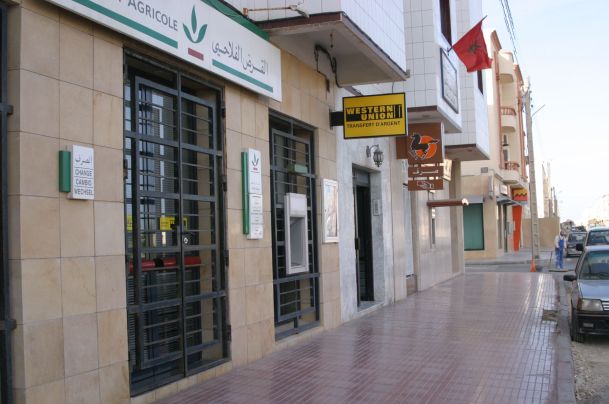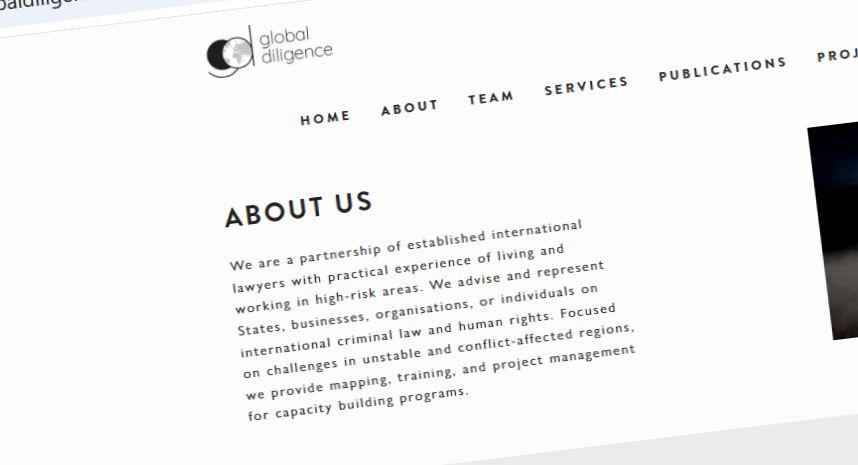
As EBRD is rolling out millions of new loans to Morocco's green energy transition, it remains unknown whether the international bank will also fund controversial businesses in occupied Western Sahara.
On 16 February this year, the European Bank for Reconstruction and Development (EBRD) announced a large support package to businesses in Morocco for its important energy transition. However, will this money be used in occupied Western Sahara?
The bank has been vague on this in the past, as correspondence between the London-based bank and the Western Sahara Campaign UK shows. See the full correspondence below.
The bank has so far shied away from responding to questions related to clarifying the bank's understanding of the geographical scope of their member country, Morocco. This while it has repeatedly hinted that it could, in fact, allow projects in the occupied territory, outside of Morocco's internationally recognised borders. In 2014, EBRD even reported that it had supported a fisheries exporting company in El Aaiun, calling the location of the factory “Laayoune au Maroc”.
The large new loan is made together with the Green Climate Fund and the European Union. It involves “providing a financial package of up to €25 million to Crédit du Maroc to boost Morocco’s green transition.” EBRD explained that €18.75 million will be coming from EBRD, while €6.25 million will be provided by the Green Climate Fund.

occupied Western Sahara.
The loan is granted to Crédit du Maroc, which will roll out the programme. Crédit du Maroc is a subsidiary of Crédit Agricole, which in turn lists six agencies in the occupied territory. Western Sahara Resource Watch (WSRW) wrote to Crédit Agricole in December 2021 regarding its presence in Western Sahara, but the company has yet to respond.
The content of the EBRD's Green Economy Financing Facility is summarised on an EBRD website dedicated to the programme. The funds will be “lent to small and medium-sized enterprises and to corporates for investments in climate change mitigation and adaptation technologies.”
This is the fourth time that the EBRD has given a large loan for Morocco's energy transition. In 2021 and 2022, in total 50 million Euros of unsecured loans were given to the two Moroccan banks Société Générale Maroc and BMCI - both banks having offices in the occupied territory. In 2019, a loan was given to the Moroccan bank BMCE, which did not respond to a letter from Western Sahara Campaign UK. The entire correspondence below comes from the understanding of EBRD as to where such funds can be used following the EBRD-BMCE package.
In 2015, when the EBRD was revising its country strategy for Morocco, WSRW submitted a number of remarks about the draft strategy. The remarks were taken note of by the bank, but no clarification was given as to the geographical scope of the strategy.
On 28 March 2022, the EBRD announced that it will hold its upcoming Annual Meeting in Marrakech, in May. The bank shows less vagueness in its approach to occupied parts of Ukraine, condemning the Russian invasion. A paper by Policy Department of the European Parliament's has called for a coherent EU approach to the occupations in the EU neighbourhood, such as Crimea and Western Sahara.
Morocco's illegal and brutal invasion of Western Sahara caused half the people of the territory to flee. Morocco denies the Saharawi people's right to self-determination and their basic human rights.
The European Investment Bank, the European Commission and the German Development Bank have been clear that they cannot support projects in occupied Western Sahara.
The correspondence
- WSCUK to EBRD 22 January 2019. WSCUK asks if the country strategy for Morocco is applicable to the territory of ‘Morocco’, as defined by the ECJ, or whether it also applies to areas outside of the internationally recognised borders and what mechanisms are in place “to ensure that the funds loaned to BCME will not end up funding projects in the occupied territory that Morocco holds under military occupation”.
- EBRD to WSCUK on 4 February 2019. The bank mentions that its strategy applies to “Morocco”; but without giving any further clarification as to what that means to them. EBRD failed to answer the two questions above. The bank underlines that sub-projects that fall under its support have to be “reviewed by EBRD".
- WSCUK to EBRD 7 March 2019. As EBRD had failed to clearly respond to the geographical application of its support, these questions were repeated. It was also asked whether EBRD had reviewed "any projects that are or were partially or fully implemented and/or applicable to the territory", and what the outcome of such review was in that case.
- EBRD wrote WSCUK on 27 March 2019. The bank does not respond to any of the questions. Instead it notes that "while EBRD has taken note of key UN Resolutions regarding the Western Sahara issue in developing its Country Strategy for Morocco, the EBRD as an international financial institution does not take a position or express a formal view in relation to the status of disputed territories. Without prejudice to the foregoing, the Bank reiterates that the current Country Strategy for Morocco does not envisage EBRD investment operations in the Western Sahara".
- WSCUK wrote EBRD on 29 May 2020. WSCUK questions why EBRD calls the territory “disputed” taking into account the clear legal status of the territory. In addition, the organisation asks another five questions:
"Concerned that the EBRD might view the territory differently from international courts, we took the liberty of looking into how the EBRD has addressed and referred to Western Sahara in other contexts on its website.This research has led us to ask you the questions below. We would be grateful if you could provide separate answers for each of the points we raise:
In 2018, EBRD published a report called ‘The investor base of securities markets in the EBRD region’. From what we understand, EBRD defines Morocco to be part of the region it works in. The mentioned report includes a reference to the bank ‘Banque Populaire de Laâyoune’. See: https://www.wsrw.org/files/dated/2020-04-09/ipreo_ebrd_report_13.04.18.pdf
1. Is it the EBRD’s opinion that the city of El Aaiun – which is the location of this particular company – is located within what it refers to as ‘the EBRD region’?
An EBRD presentation given in Casablanca in 2014, states that ‘Laayoune’ is located in Morocco. It furthermore states that EBRD’s Trade Facilitation Programme (TFP) assisted a company by the name of Iglo Fish, which is located in Western Sahara, to export frozen fish to an importer in Romania. “Iglo Fish SA. basé à Laayoune au Maroc vend des sardines congelées à un importateur basé à Bucarest en Roumanie. OTP Bank Romania émet une lettre de crédit, confirmée par BMCE Bank au Maroc. La BERD garantit jusqu’à 100% du risque de défaut de paiement commercial et politique.” https://www.wsrw.org/files/dated/2020-04-09/ebrd2015.pdf
2. Is the information presented in the above document accurate? The EBRD has facilitated trade for this particular company? If so, does it continue to do so?
According to your website, the TFP guarantees “are provided to international commercial banks thereby covering the political and commercial payment risk of transactions undertaken by issuing banks in the EBRD’s countries of operations.” It is set up to facilitate trade “to, from and amongst the EBRD countries”. There are 26 such countries.
3. Does the EBRD consider the company mentioned in the EBRD presentation above, Iglo Fish SA, to be located in any of these 26 countries?
4. Have other companies located in Western Sahara received such assistance over the last decade? If so, which companies, and for what purpose?
5. In view of the ICJ’s stating that Morocco’s claims to Western Sahara are unfounded, that the CJEU calls Western Sahara ‘separate and distinct’ from the territory of Morocco, and that the CJEU states that consent has to be obtained upon dealing with the territory: Did EBRD seek consent from the people of Western Sahara to facilitate trade from their territory?- EBRD wrote WSCUK on 25 June 2020. None of the questions regarding the geographical limitation of Morocco vs. Western Sahara were addressed. Regarding the support to Iglo Fish, the EBRD wrote: “EBRD has no on-going engagement with the stated company, Iglo Fish SA in the Western Sahara in the city of El Aaiun. Every project is reviewed in the development stage, which includes environmental, social and political reviews. Local communities are being engaged when stakeholder engagement plans are developed”.
Since you're here....
WSRW’s work is being read and used more than ever. We work totally independently and to a large extent voluntarily. Our work takes time, dedication and diligence. But we do it because we believe it matters – and we hope you do too. We look for more monthly donors to support our work. If you'd like to contribute to our work – 3€, 5€, 8€ monthly… what you can spare – the future of WSRW would be much more secure. You can set up a monthly donation to WSRW quickly here.
European funder EBRD confirms it has no plans for Western Sahara
The European Bank for Reconstruction and Development has confirmed that it will not provide financial support to projects located in occupied Western Sahara.
As Europe lenders shy Sahara controversy, Morocco looks to China
Several big European investment banks have indicated that they will not finance renewable energy projects in occupied Western Sahara. As a result, Morocco is forced to look for other, less ethically inspired funders.
Moroccan King's wind farm in occupied land now carbon credited approved
One year ago, a wind farm project that Morocco is undertaking in occupied Western Sahara was turned down when seeking to obtain UN-sponsored carbon credits. Now, that same project has been approved by another, private credit issuing agency.
Global Diligence defends operations on occupied land
The legal advisory firm Global Diligence, which presents itself as expert on ‘heightened due diligence’, misrepresents international law in occupied Western Sahara.



